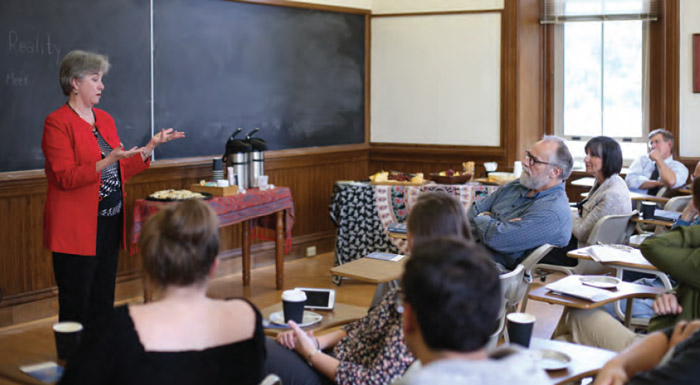
Contact With Reality: Michael Polanyi’s Realism and Why It Matters (Cascade, 2017), the fifth published work by Geneva Philosophy Professor Dr. Esther Lightcap Meek, is a reflective work that develops the concept of realism found in her previous books, Longing to Know: The Philosophy of Knowledge for Ordinary People (Brazos, 2003); Loving to Know: Introducing Covenant Epistemology (Cascade, 2011); and A Little Manual for Knowing (Cascade, 2014).
As a member of the Polanyi Society since 1990, Meek has dedicated her efforts to understanding the work of the scientistturned- philosopher, Michael Polanyi. His work and contribution to philosophy focuses on realism through personal discovery and epistemology, the study of knowledge.
In the new book, Meek advances her series of books on epistemology. Contact With Reality consists of two parts: her doctoral dissertation and her new applied work. Meek explains that unlike her previous books, this book is more scholarly.
“I’m not sure if this book is a natural sequel,” she equivocates regarding Contact With Reality’s relation to her earlier books. She does recognize a transformation in herself from part one to part two of the book. “I was a baby skeptic [at the time of the dissertation],” she states. “I wanted the book – with its old and new – to show that shift.” She describes herself now as an “exuberant realist.”

She says, “I want the readers to understand that this really matters, and that modernity is an anti-realist age. People today do not trust modernity. My students – when I have first used the word ‘reality’ – they want me to define it. They just presume that you can only use it to say, this is ‘my reality’ or ‘your reality.’ They’ve taken the word and made it subjective. We think we can make reality whatever we want, which means we don’t trust it to be there for us. We think we are supposed to make it up.”
Meek’s Contact With Reality challenges the “anti-realism” Ultimately, she hopes this concept of realism and reading all her books bring much-needed, deep philosophical healing, and restoration of reality. This is something that Dr. Meek takes joy in bringing to readers. She explains that for those who do read there is this natural process where struggle resides and that’s necessary. Meek definitely sees the fruit of her labor flourish in the lives of those who stumble across it. “I have learned to stop looking for fireworks and celebrate the people that come in contact with reality through my books,” she concludes, “Touching just one person has infinite value.” perspective of modern Western culture and its contributions to doubt, skepticism, relativism and atheism.
Meek says anti-realism can result from several motivations. She explains, “Anti-realism can be motivated by fear. But power and control can motivate it, as well. I’ve heard foremost scientists say about their work, that their claims just summarize data rather than witnessing to an unknowable reality. This can be because we want the control that certainty brings.” She continues, “But being in the image of God, our better nature wins out, and we don’t consistently live out the antirealism we often voice.” What Dr. Meek’s work offers is a Polanyi-inspired account of knowing as communion with an abundantly generous and endlessly interesting real.
Two big questions have drawn Meek ever since her youth: How do I know that God exists? And, How do I know that there is a world outside my mind? For Meek, the process of writing this book was like writing the others, and like a creator’s process. “But for me, the act of writing is my philosophizing; that’s when I make discoveries and breakthroughs in understanding. That’s exciting.” Through working through this fourth book on the topic, she completed her effort to answer those philosophical questions that had gripped her for decades, which made it really special. “The monkey fell off my back. I felt it when I finished writing the last chapter, and it felt so good,” she laughs. “Now I’m finally ready to begin new ventures!” Meek understands that people don’t exactly gravitate to reading philosophy.
She jokes about quickly getting over her initial hope that publishing a philosophy book would make her famous on the spot; “there would be fireworks and celebration.” In fact, she says, a lot of people hear the topic and fear that it will take them way beyond the understandable. “But the feeling they should get when reading my books is more the feeling of reconnection with yourself,” she explains. Ultimately, she hopes this concept of realism and reading all her books bring much-needed, deep philosophical healing, and restoration of reality.
This is something that Dr. Meek takes joy in bringing to readers. She explains that for those who do read there is this natural process where struggle resides and that’s necessary. Meek definitely sees the fruit of her labor flourish in the lives of those who stumble across it. “I have learned to stop looking for fireworks and celebrate the people that come in contact with reality through my books,” she concludes, “Touching just one person has infinite value.”